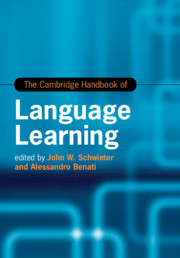Book contents
- The Cambridge Handbook of Language Learning
- Cambridge Handbooks in Language and Linguistics
- The Cambridge Handbook of Language Learning
- Copyright page
- Contents
- Figures
- Tables
- Contributors
- Acknowledgements
- Introduction
- Part I Theories
- Part II Methods
- Part III Skill Development
- Part IV Individual Differences
- Part V Pedagogical Interventions and Approaches
- 20 Pedagogical Interventions to L2 Grammar Instruction
- 21 Task-Based Language Learning
- 22 Task and Syllabus Design for Morphologically Complex Languages
- 23 Proficiency Guidelines and Frameworks
- 24 Technology-Mediated Language Learning
- 25 Content-Based L2 Teaching
- 26 Conceptions of L2 Learning in Critical Language Pedagogy
- Part VI Context and Environment
- Part VII Moving Forward
- Index
- References
26 - Conceptions of L2 Learning in Critical Language Pedagogy
from Part V - Pedagogical Interventions and Approaches
Published online by Cambridge University Press: 25 June 2019
- The Cambridge Handbook of Language Learning
- Cambridge Handbooks in Language and Linguistics
- The Cambridge Handbook of Language Learning
- Copyright page
- Contents
- Figures
- Tables
- Contributors
- Acknowledgements
- Introduction
- Part I Theories
- Part II Methods
- Part III Skill Development
- Part IV Individual Differences
- Part V Pedagogical Interventions and Approaches
- 20 Pedagogical Interventions to L2 Grammar Instruction
- 21 Task-Based Language Learning
- 22 Task and Syllabus Design for Morphologically Complex Languages
- 23 Proficiency Guidelines and Frameworks
- 24 Technology-Mediated Language Learning
- 25 Content-Based L2 Teaching
- 26 Conceptions of L2 Learning in Critical Language Pedagogy
- Part VI Context and Environment
- Part VII Moving Forward
- Index
- References
Summary
A view of second language instruction that takes social justice as both major focus and aim is now quite familiar in the field of applied linguistics. Over fifty years of publishing (on a small scale, with only scattered reports of individual efforts), the area has paid little attention to mainstream psychological learning theory nor to conventional second language acquisition (SLA) theory. Its own publications have drawn on educational theory, curriculum theory, social theory (not to mention political philosophy), first language (L1) literacy instructional practices (composition and rhetoric), critical discourse analysis, and the pedagogy of adult education, among other areas and fields. It has been a stimulus to the broader development of critical applied linguistics. Its most immediate conceptual neighbour in applied linguistics, perhaps, is second language (L2) work on learner autonomy, though with little acknowledgement. This literature contains both broad-brush and narrower descriptions of what is or should be going on in critical (language) pedagogy classrooms, as well as more theoretical discussions concerning their intent.
- Type
- Chapter
- Information
- The Cambridge Handbook of Language Learning , pp. 621 - 646Publisher: Cambridge University PressPrint publication year: 2019

